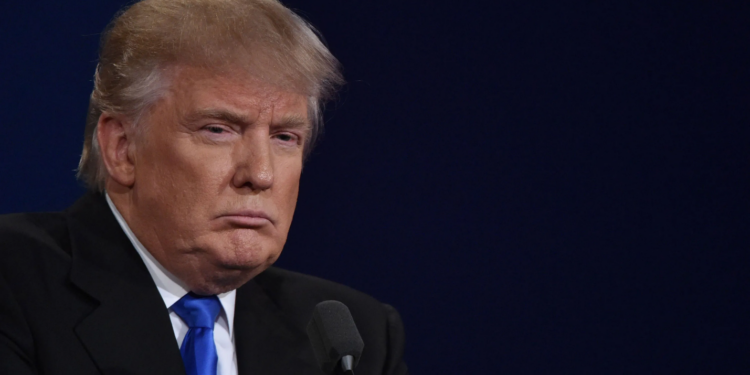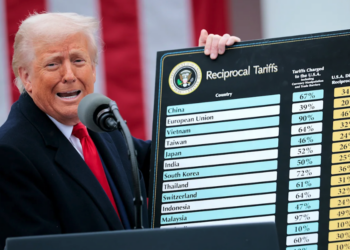Nigeria’s trade relationship with the United States has come under scrutiny as U.S. President Donald Trump imposed massive tariffs on three of America’s largest trade partners Mexico, Canada, and China.
According to data from the United States Census Bureau, Nigeria recorded total trade of about $8.2 billion in 2023, which increased to approximately $9.1 billion as of September 2024.
However, concerns are mounting following Trump’s imposition of substantial tariffs on imports from Canada, Mexico, and China.
Effective February 4, 2025, a 25% tariff will be levied on all goods from Canada and Mexico, while a 10% tariff will be applied to Canadian oil exports and Chinese goods.
This policy shift has triggered immediate retaliatory measures. Canadian Prime Minister Justin Trudeau announced matching 25% tariffs on up to C$155 billion worth of U.S. imports, underscoring the deep historical ties between the two nations.
Potential Impact on Nigeria
For Nigeria, these tariffs could impact key imports from the United States, exacerbating inflationary pressures. According to data from the National Bureau of Statistics (NBS), Nigeria’s major imports from the U.S. include:
- Gas oil
- Motorcycles and cycles fitted with auxiliary motors
- Petrol fuel
- Other medicaments not elsewhere specified
- Other static converters not specified
- Penicillins or derivatives thereof
In the second quarter of 2024, Nigeria’s top imports from the U.S. included:
- Butanes
- Used vehicles with diesel or semi-diesel engines (cylinder capacity > 2500cc)
- Motor spirit
- Ethyl alcohol and other spirits, denatured, of any strength
- Additional used diesel vehicles
For the first quarter of the year, the top imports consisted of:
- Motor spirit (ordinary gasoline)
- Other air compressors
- Other lubricating oils for further mixing
- Blue whitings (Micromesistius poutassou and Micromesistius australis) meat, frozen
- Other medicaments not elsewhere specified
From this data, it is evident that Nigeria’s major imports from the U.S. include motor vehicles and parts, petroleum products, and alcohol categories that could see price increases as the tariff war intensifies.
Despite the trade challenges, Nigeria has maintained a trade surplus with the United States. According to 2024 U.S. trade data, Nigeria exported approximately $5.29 billion worth of goods to the U.S. while importing about $3.88 billion, resulting in a trade surplus of $1.4 billion in Nigeria’s favor.
In 2023, total trade between Nigeria and the U.S. stood at $8.2 billion, with Nigeria running a trade surplus of $3.1 billion by exporting more to the U.S. than it imported.
However, trade volumes between both countries have declined significantly—falling by as much as 73% in the last decade, largely due to the U.S.’s drastic reduction in crude oil imports from Nigeria.
How Rising U.S. tariffs could impact Nigeria’s inflation
The potential upward adjustment of tariffs on U.S. goods could have a ripple effect on Nigeria’s inflation outlook for 2025. One of the most immediate areas of concern is the rising cost of imported used cars, commonly referred to as “Tokunbo” vehicles in Nigeria.
Nigeria relies heavily on the U.S. for its used car imports, which were valued at N1.47 trillion in 2023. As of September 2024, imports stood at N892 billion. With used cars already beyond the financial reach of most Nigerians, many first-time buyers are now opting for locally used vehicles instead.
- If higher tariffs make U.S. car exports more expensive, it could further raise the cost of acquiring a vehicle in Nigeria. This would, in turn, affect transport costs, a major contributor to inflation.
- Transport inflation currently accounts for 10.7% of the total Consumer Price Index (CPI). A rise in car prices, coupled with higher fuel costs, would increase the cost of public transportation, logistics, and general goods and services.
- Additionally, petroleum-based products such as gas oil, motor spirit, and lubricating oils—are also major imports from the U.S. If tariffs increase their costs, Nigeria could face higher fuel prices, compounding existing inflationary pressures driven by exchange rate fluctuations and global crude oil price dynamics.
One major development that could help cushion Nigeria from the impact of rising fuel costs is the increased local refining capacity, particularly with the commencement of operations at the Dangote Refinery.
- The refinery, Africa’s largest, has the capacity to refine 650,000 barrels of crude oil per day, significantly reducing Nigeria’s reliance on imported petroleum products.
- This could help offset potential price hikes on fuel imports from the U.S. by increasing domestic supply, stabilizing fuel prices, and reducing Nigeria’s vulnerability to external trade disruptions.
- With more refined products being produced locally, Nigeria can cut down on its imports of petroleum products, a key category of U.S. exports to Nigeria.
This shift could not only save foreign exchange but also mitigate the inflationary impact of any tariff-induced price increases in global petroleum markets.





















